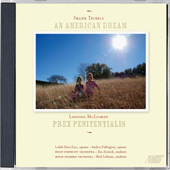

This new Albany Records release, presents two stylistically and emotionally similar works for soprano and orchestra by American composers
Lansing McLoskey
(1964-), and
Frank Ticheli (1958-). If you click on the preceding links to their individual websites, you will notice that even though they derive from two different musical backgrounds, their paths have somehow crossed with the writing of these two works.
Lansing McLoskey's Prex Penitentialis is based on the writings of the Renaissance philosopher Petrarch, and deals with the battles
and struggles between body and soul, a primal conflict that has plagued mankind from medieval times up until today. It opens with a 15th century Gregorian chant sounding phrase,
followed by the toll of a bell, but quickly assumes its angst driven 21th century garb, with dark and elusive strands of probing orchestral sounds that well support the
pain and lamentations within the text, sung accordingly by soprano Andrea Fullington. The orchestra and voice, particularly during the second movement,
always seem to follow divergent paths, but somehow manage to converge and focus your attention on the sombre subject and confessional purpose within the text. A rare
skill that Lansing McLoskey has obviously mastered. Near the end of the piece, the tolling bell returns and liturgical latin text brings the work to an unresolved conclusion.
An evocative and inspired work that does a great job of connecting the centuries old script with today's troubled psyche.
Oddly enough, Frank Ticheli's inspiration for his work titled An American Dream is based on texts that address the sea of anxiety during
the winding down of 20th century America, which in the end reveals itself as an expression of hope. Two different composers, two different texts, one subject matter that
transcends time and brings two minds together through the same concept. Although most of the music in this piece is dark and evocative, and as the title suggests, even
dreamy and nebulous at moments, it does display a stronger affinity to the American sound. A touch of spirituals in "No moon in the sky" and a swagger at times similar
to Bernstein's "Candide". Soprano Leilah Dione Ezra slips in and out of each separate movement with ease, and well conveys each one's intent.
Two modern works then that resonate with the listener and don't attempt to alienate their audience. They achieve this by simply reaching into the meaning behind the words
in the text, and emphasizing it's intent through powerful and emotive music.
Jean-Yves Duperron - May 2011